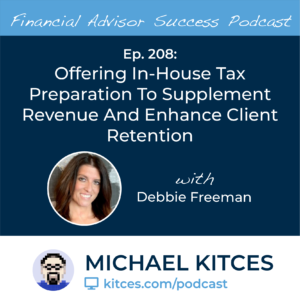 Welcome back to the 208th episode of the Financial Advisor Success Podcast!
Welcome back to the 208th episode of the Financial Advisor Success Podcast!
My guest on today’s podcast is Debbie Freeman. Debbie is a partner with Peak Financial Advisors, an independent RIA based in Denver, Colorado, that oversees $175 million of assets under management for 105 client families. What’s unique about Debbie, though, is the way her firm does not only offer tax planning for their clients but also in-house tax preparation, a service for which they charge separately but view as an essential component to both add value for clients and better retain them with the firm.
In this episode, we talk in-depth about how Debbie and her firm actually handle operating a tax-preparation business within their wealth-management firm, the cumulative amount of staffing hours it takes to collect and input data, prepare the return, review the return, and file the return. How the seasonality of tax preparation, with April 15th and October 15th deadlines, forces the firm to engage in meeting surges during the off months for their non-tax-planning regular review meetings with clients, why Peak Financial has decided to keep its tax preparation in-house and not work externally with other CPAs, and how the real return on tax preparation for clients may not just be the additional 5% of revenue it generates but the additional 5% increase in retention rates it provides for Peak’s core advisory business.
We also talk about Debbie’s own journey through the financial-services industry, how she started out at a Big Four accounting firm but quickly realized that she didn’t enjoy traditional accounting work, the way she proactively reached out about a potential opening at a local advisory firm to find her first planning job, the stresses that Debbie faced in her early career in trying to prove her worth to the firm, when she wasn’t in a revenue-generation role, and the change in mindset that came after Debbie took her first maternity leave that, ultimately, helped her contribute to her becoming a partner in the firm. And be certain to listen to the end where Debbie shares how different the mentality really is when you go from an employee to an owner of an advisory firm, how seemingly black-and-white planning strategies for clients take on shades of gray, as we get more experienced in our careers and better appreciate the human nuances, and the way challenges in our personal lives, and sometimes personal tragedies, can alter our career trajectories in ways that turn out positive.
So whether you’re interested in learning about why Debbie decided to transition from accounting to financial planning, how she uses meeting surges to manage client meetings around her busy tax season, or how tax preparation makes an advisory firm more “sticky” for clients, then we hope you enjoy this episode of the Financial Advisor Success podcast.







